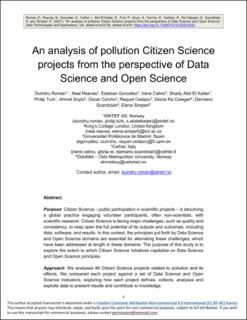| dc.contributor.author | Roman, Dumitru | |
| dc.contributor.author | Reeves, Neal | |
| dc.contributor.author | Gonzalez, Esteban | |
| dc.contributor.author | Celino, Irene | |
| dc.contributor.author | Abd El Kader, Shady | |
| dc.contributor.author | Turk, Philip Andreas | |
| dc.contributor.author | Soylu, Ahmet | |
| dc.contributor.author | Corcho, Oscar | |
| dc.contributor.author | Cedazo, Raquel | |
| dc.contributor.author | Re Calegari, Gloria | |
| dc.contributor.author | Scandolari, Damiano | |
| dc.contributor.author | Simperl, Elena | |
| dc.date.accessioned | 2022-02-23T12:20:15Z | |
| dc.date.available | 2022-02-23T12:20:15Z | |
| dc.date.created | 2021-10-21T13:48:31Z | |
| dc.date.issued | 2021-05-05 | |
| dc.identifier.citation | Data Technologies and Applications. 2021, 55 (5), 622-642. | en_US |
| dc.identifier.issn | 2514-9288 | |
| dc.identifier.uri | https://hdl.handle.net/11250/2981009 | |
| dc.description.abstract | Purpose: Citizen Science – public participation in scientific projects – is becoming a global practice engaging volunteer participants, often non-scientists, with scientific research. Citizen Science is facing major challenges, such as quality and consistency, to reap open the full potential of its outputs and outcomes, including data, software, and results. In this context, the principles put forth by Data Science and Open Science domains are essential for alleviating these challenges, which have been addressed at length in these domains. The purpose of this study is to explore the extent to which Citizen Science initiatives capitalise on Data Science and Open Science principles.
Approach: We analysed 48 Citizen Science projects related to pollution and its effects. We compared each project against a set of Data Science and Open Science indicators, exploring how each project defines, collects, analyses and exploits data to present results and contribute to knowledge.
Findings: The results indicate several shortcomings with respect to commonly accepted Data Science principles, including lack of a clear definition of research problems and limited description of data management and analysis processes, and Open Science principles, including lack of the necessary contextual information for reusing project outcomes.
Originality: In the light of this analysis, we provide a set of guidelines and recommendations for better adoption of Data Science and Open Science principles in Citizen Science projects, and introduce a software tool to support this adoption, with a focus on preparation of data management plans in Citizen Science projects. | en_US |
| dc.description.sponsorship | The work in this paper is partly funded by the H2020 project ACTION (grant number 824603). | en_US |
| dc.language.iso | eng | en_US |
| dc.publisher | Emerald | en_US |
| dc.relation.ispartofseries | Data Technologies and Applications;Volume 55 - Issue 5 | |
| dc.rights | Navngivelse-Ikkekommersiell 4.0 Internasjonal | * |
| dc.rights.uri | http://creativecommons.org/licenses/by-nc/4.0/deed.no | * |
| dc.subject | Citizen Science | en_US |
| dc.subject | Data Science | en_US |
| dc.subject | Open Science | en_US |
| dc.subject | Pollution projects | en_US |
| dc.subject | Data Management Plan | en_US |
| dc.subject | Software | en_US |
| dc.title | An analysis of pollution Citizen Science projects from the perspective of Data Science and Open Science | en_US |
| dc.type | Peer reviewed | en_US |
| dc.type | Journal article | en_US |
| dc.description.version | acceptedVersion | en_US |
| cristin.ispublished | true | |
| cristin.fulltext | postprint | |
| cristin.fulltext | postprint | |
| dc.identifier.doi | https://doi.org/10.1108/DTA-10-2020-0253 | |
| dc.identifier.cristin | 1947576 | |
| dc.source.journal | Data Technologies and Applications | en_US |
| dc.source.volume | 55 | en_US |
| dc.source.issue | 5 | en_US |
| dc.source.pagenumber | 27 | en_US |

